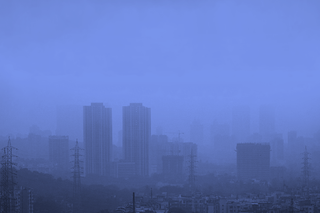
Rising Humidity Linked to Women, Young People’s Increased Risk of Suicide: Study
This is the first analysis to highlight global trends in climate change’s possible impact on mental health.

The climate crisis is amplifying intense spells of humidity, which may have a bearing on people’s mental health. A new study, spanning over 37 years, found the rate of suicide is higher in regions with high humidity. Worse, women and young people are at heightened risk due to this correlation.
The research, published in NatureScientific Reportsthis week, looked at data from 60 countries. It drew a comparison between how strongly heatwave conditions, as opposed to humidity, impact people’s mental health. The researchers found statistical evidence that periods of humidity are more strongly linked to suicides as opposed to heatwaves.
“This is the first study of its kind and is essential for analyzing climate change’s possible impact on mental health,” the researchers noted in the paper, arguing studies so far were limited to individual countries instead of highlighting global patterns. Moreover, only a handful of studies have conclusively linked suicide to changing climate.
Previous research has explored how climate change-induced extreme weather — such as droughts, floods, heatwaves — could impact depression and the risk of suicide. The consensus is that climate change has unprecedented effects on people’s emotional and physical health.
“It’s the shock of going from colder temperatures to extreme temperatures that is dangerous to mental health,” Dr. Sonja Ayeb-Karlsson, who co-authored the research, said.
Humidity, in particular, impacts the body in varied ways. Humidity disrupts the body’s ability to regulate temperature — leading to heat stress and increased discomfort. This is particularly concerning for people already struggling with mental health conditions (such as bipolar disorder, dementia, schizophrenia), as antidepressants further interfere with the body’s ability to regulate temperature.
“If you talk about mental health there are quite a lot of links – there’s anxiety, it’s hard to sleep, it becomes unbearable,” Ayeb-Karlsson told The Guardian. “Sleep deprivation is a massive thing … It’s difficult to sleep when it’s hot and even more when it’s humid.”
“Humidity is more dangerous than dry heat alone because it impairs sweating — the body’s life-saving natural cooling system,” Down to Earth noted. This is more concerning as the frequency and intensity of humidity are on a steady rise due to global heating.
Another aspect the present study hints at is the disproportionate burden women and young people may face. A 2020 analysis of 130 peer-reviewed studies found women and girls often face disproportionately high health risks due to climate change impact as compared to men and boys. Social structures, power relations, food insecurity, limited access to reproductive health may make them vulnerable to suicide risk.
“We need to look further into these relations and the contextual reasons behind this in diverse geographical areas and social groups,” the researchers said.
Related on The Swaddle:
How a Robust Climate Education Curriculum Can Address Young Adults’ Eco‑Anxiety
Moreover, according to the current research, 40 countries, including some in Asia and Africa, are particularly vulnerable. In Africa, for instance, humidity and related discomfort was found to have exacerbated suicidal tendencies in Egypt and South Africa. Even colder countries, like Europe, may find a link between suicide and humidity as global warming increases the temperature.
A 2018 study established a direct link between rising temperatures and increased rates of suicide, irrespective of wealth and the usual climate of the area. The consistency in the relationship was such that the impact on suicides could be likened to the impact of economic recessions on self-harm.
“Even modest changes in suicide rates due to climate change could [lead to] large changes in the associated global health burden, particularly in wealthier countries where current suicide rates are relatively high,” the researchers said then.
A growing body of research highlights the rise of “eco-anxiety,” or “solastagia” — a fear of environmental cataclysm, of worrying about the irreversible impact of climate change on the planet.
“The mental health impacts of the climate crisis have profound implications. Psychological responses, such as conflict avoidance, fear, helplessness, and resignation, are serious barriers to collective action to mitigate further global warming and to build resilience and adaptation strategies. Neglecting the effects of increasing eco-anxiety risks exacerbating health and social inequalities between those more or less vulnerable to these psychological impacts,” researchers noted in The BMJ last month.
Saumya Kalia is an Associate Editor at The Swaddle. Her journalism and writing explore issues of social justice, digital sub-cultures, media ecosystem, literature, and memory as they cut across socio-cultural periods. You can reach her at @Saumya_Kalia.
Related


Cub Trade is Driving Cheetahs Towards Extinction
